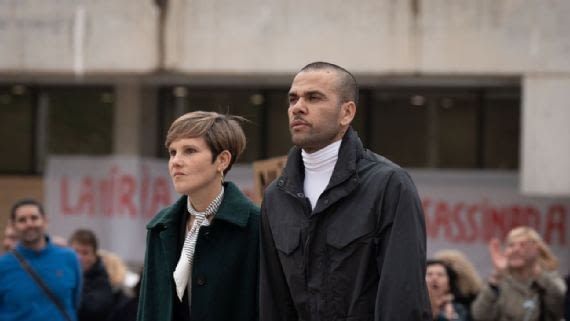Dani Alves’ Conviction Overturned: A Deep Dive into the Case and Its Implications
In a dramatic turn of events, Brazilian soccer star Dani Alves has won his appeal against a sexual assault conviction. The Spanish court’s decision to overturn the ruling on Friday marks the end of a legal saga that has spanned over three years. This case, which has been closely followed by fans and legal experts alike, saw the former Barcelona defender spend 14 months in jail.
Alves was initially found guilty in February 2024 of raping a woman in a nightclub in December 2022. He was sentenced to 4½ years in prison, a verdict that he consistently denied during the three-day trial. The court’s recent ruling stated that there was “insufficient evidence” to dismiss Alves’ presumption of innocence, a significant factor in the appeal’s success.
Alves’ defense lawyer, Inés Guardiola, expressed relief and satisfaction with the outcome, telling Catalan radio RAC1, “Dani Alves is innocent, and that has been proven. Justice has finally been served.” Meanwhile, the plaintiff’s lawyer has yet to respond to requests for comment from The Associated Press.
The Legal Landscape: Spain’s “Only Yes Means Yes” Law
The Alves trial was the first high-profile case since Spain’s legal overhaul in 2022, which made consent central to defining a sex crime. This change was a response to widespread protests following a gang rape case during the San Fermin bull running festival in Pamplona in 2016. The legislation, popularly known as the “only yes means yes” law, defines consent as an explicit expression of a person’s will, clarifying that silence or passivity do not equate to consent.
Despite the new legal framework, the four judges of a Barcelona-based appeals court unanimously decided to overturn Alves’ conviction. They cited discrepancies between the plaintiff’s testimony and video evidence taken before the woman and Alves entered the bathroom, where she alleged the assault occurred.
Details of the Case
Before last year’s trial, the woman claimed to state prosecutors that she had danced with Alves at the nightclub and willingly entered the bathroom. However, she alleged that when she wanted to leave, Alves prevented her, slapped her, insulted her, and forced her to have sex against her will. Alves, on the other hand, denied these accusations during the trial, stating, “She never told me to stop. We were both enjoying ourselves.” He also refuted claims of slapping or insulting her.
Alves, now 41, was incarcerated from January 20, 2023, to March 2024. He was released after posting a bail of 1 million euros (then $1.2 million) while awaiting his appeal. As part of his bail conditions, he surrendered his passports, with prosecutors arguing against his release due to a potential flight risk.
Potential Next Steps
Prosecutors had sought to increase Alves’ prison sentence to nine years, while the woman’s lawyer aimed for a 12-year sentence. However, with the recent ruling, the decision could be appealed to the Spanish supreme court in Madrid, leaving the door open for further legal proceedings.
Alves’ Storied Career
Alves is celebrated as one of the most successful players of his generation, having won numerous titles with elite clubs such as Barcelona, Juventus, and Paris Saint-Germain. At the time of his arrest, he was playing for Liga MX club Pumas, which terminated his contract immediately following the charges.
- Alves’ appeal highlights the complexities of legal proceedings in high-profile cases.
- The case underscores the importance of evidence and testimony in court rulings.
- Spain’s legal reforms continue to shape the landscape of sexual assault cases.
As the dust settles on this chapter of Alves’ life, the implications of this case will likely resonate within the legal community and beyond, sparking discussions on consent, evidence, and justice.
Originally Written by: Associated Press





















